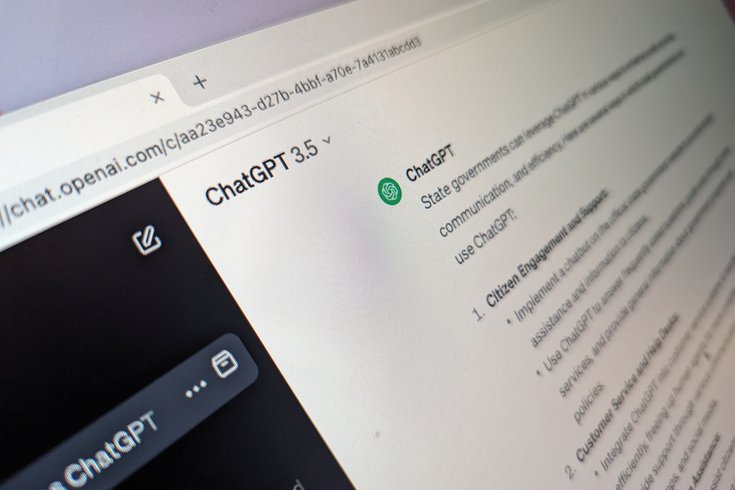
January 10, 2024
 John Paul Titlow/PhillyVoice
John Paul Titlow/PhillyVoice
Some state employees in Pennsylvania will have access to ChatGPT to help them do their jobs, the state recently announced. The test program will use a version of ChatGPT with extra security features that will allow workers to use generative AI to complete tasks, like writing and editing text, updating outdated policy language and more.
The generative AI revolution is coming to Harrisburg.
In a first-of-its-kind partnership, Pennsylvania Gov. Josh Shapiro signed an agreement with software company OpenAI to make its popular ChatGPT artificial intelligence chatbot available to a test group government employees.
Starting this month, these state employees will have access to an enterprise version of ChatGPT to help them conduct government business, Shapiro's office announced Tuesday. The test program, which will be limited to 50 employees at first and use a version of ChatGPT with extra security features, will allow government officials to use generative AI to help them complete tasks, like writing and editing text, updating outdated policy language, generating code, drafting job descriptions and resolving conflicts and redundancies in internal policy documentation, the governor's office said.
"This first-in-the-nation pilot with OpenAI will help us safely and securely learn from and use this important technology to serve Pennsylvanians and empower our workforce," Shapiro said. "Generative AI is here and impacting our daily lives already – and my Administration is taking a proactive approach to harness the power of its benefits while mitigating its potential risks."
ChatGPT and other AI tools — like Midjourney, which can generate images from written prompts, and Google Bard, another AI chatbot — have exploded in popularity over the last 14 months. Since launching in November 2022, ChatGPT has ballooned to over 180 million users, becoming the fastest-growing consumer technology of all time and a disruptive force in a range of industries and professions.
The power behind generative AI is an algorithm called a large language model trained using datasets of text from the internet and other sources, which allows them to rapidly recognize and generate responses to user input referred to as prompts. The AI output mimics human-created content and information.
Generative AI is altering the way people create written and image-based content and had a disruptive impact on fields, like law, software development, medicine, journalism, customer service and banking. The consulting firm McKinsey, which has an AI-consulting arm called QuantumBlack, drafted a report in June predicting AI productivity could add more than $4 trillion in value to the U.S. economy each year.
In September 2023, the city of San Jose, California, released a 23-page document to guide it's municipal employees in their use of ChatGPT and other generative AI tools. The city advises workers to thoroughly fact-check any content generated with AI tools, draw a line between personal and professional use of such tools and avoid entering any information into chatbots that isn't ready for public dissemination – since the data could be subject to data leaks or public records requests.
Meanwhile, several federal agencies and state governments have instituted internal bans on the technology due to concerns over privacy, security and other risks.
Today, I’m announcing that my Administration is launching a first-in-the-nation Generative AI pilot for Commonwealth employees with @OpenAI.
— Governor Josh Shapiro (@GovernorShapiro) January 9, 2024
Generative AI is here and impacting our daily lives now — and we're harnessing its benefits while mitigating its potential risks.
In September, Shapiro signed an executive order establishing a Generative AI Governing Board to help the state figure out how to harness the technology – and do so in an ethical, responsible fashion that minimizes risks like data security, information bias, accuracy and privacy-related concerns.
Shapiro's ChatGPT test hopes to overcome some of the pitfalls of generative AI by utilizing the enterprise version of the software, which has more built-in security features that aren't available in the popular consumer version of the app. The program also will be guided by strict rules, such as a prohibition of workers from entering personally identifiable information about constituents into the chatbot.
Whatever data does get entered will be protected by additional data security safeguards, and it will not be used to further train the ChatGPT' underlying AI model, the Shapiro administration said. Also the software will also be prevented from sharing data across different state agencies.
Still Pennsylvania's potential uses of ChatGPT are practically limitless, especially as the GPT-4 large language model becomes more advanced – something that is happening at a rapid clip.
Earlier this week, prompted to provide examples of how generative AI could be utilized by governments, ChatGPT listed functions like engaging with citizens, providing customer support, helping people fill out online forms, enhancing policy education, disseminating information during emergencies and helping train government employee..
"When implementing ChatGPT, it's important for state governments to prioritize user privacy, security, and ethical considerations," the AI said. "Additionally, clear communication with citizens about the capabilities and limitations of the system is crucial for building trust in the use of AI technology in government services."
For now, Pennsylvania's ChatGPT implementation will not include any constituent-facing chatbots, the Shapiro administration said. But how the state uses generative AI in the future will be determined, in part, by the pilot program. The initial phase of the test will determine ChatGPT's capabilities and limitations when it comes to conducting state business. The next step will be to expand the the the program beyond the initial pool of 50 state employees to 100.